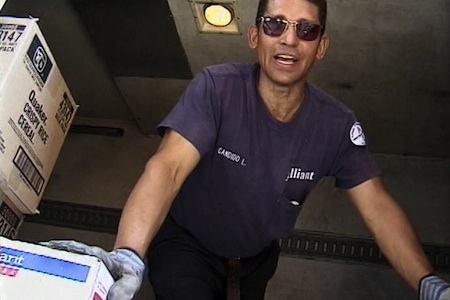“Are you happy?” That’s the question Mark Street put to his fellow New Yorkers in the last months of 1999, nearly 40 years after Edgar Morin and Jean Rouch asked the same of Parisians for their pioneering Chronicle of a Summer (1961). It’s a superficial inquiry, to be sure, but a troubling Why? is always waiting in the wings. For Morin and Rouch, the pop survey format provided occasion to scrutinize themselves alongside their subjects for a heady work of epistemology. Happy? offers a decidedly looser take on urban encounter, though it still manages to put historical contingency into play.
Street leads to the very personal nature of contentment by asking people about the coming millennium: some variation of “Are you ready for the millennium?” or “What do you think is going to happen?” As an imagined event, the Y2K turn functions as a kind of social currency. Even the most nonplussed New Yorkers (“I have to live to it!”) are cued by the thought of an unknown future; the happiness question enters this pause. In all cases, Street’s interviewees snap out of the blur of daily life in order to present themselves to the camera. Happy? is, among other things, a reverie on this deathless paradox of having to draw outside the flow of time in order to reflect upon it.
Elsewhere in the short, film footage skips along the avenues and a digital camera is trained upon a massive countdown clock. Happiness only outstrips time for as long as it lasts.
Street’s search is for the irreducible elements of personality rather than the statistical mean. His interviews delight in the gift of gab—listening to New Yorkers speak their mind, like a gentler version of the hate speech montage detonated in Spike Lee’s Do the Right Thing (1989)—but the migratory sequences linking encounters reveal a strong visual sense of the city, as well as a subtle wit. Immediately after one fellow talks of wanting to catch up on his metaphysical reading to prepare for living on a higher plane of existence, we’re plunged down into the subway for a sequence recalling Walker Evans’ hidden photographs and the stilled time of Chris Marker’s La Jetée (1962). Elsewhere in the short, film footage skips along the avenues and a digital camera is trained upon a massive countdown clock. Happiness only outstrips time for as long as it lasts.
French-Canadian documentarian Pierre Perault once told an interviewer, “When you listen to someone talking for ten minutes, you hear a certain number of things. If you’ve taped what he said and play it back the next day, you hear ten times as much.” And what if you play it back 12 years later? Today Happy? is as much inflected by 9/11 as Street’s own early work of retrospection, Brooklyn Promenade (2001). The specter is most tangible in the passing shot of a painter applying fresh paint to one of the Twin Towers in his city skyline, but it’s felt throughout in the existential tenor of conversation (“America’s still America,” one man answers, “[It’s] got little cracks, but we’re here to make it whole”). Y2K worries melt away as if from a dream, and Happy? is left clarified as a kind of floating data set for sociological reflection. Put differently, the film brings home the point that “man on the street” interviews are always speculative. You may think you know what you’re asking your subjects, but once it’s a matter of record the context is liable to change. Or as Chris Marker once put it, in a different context, “You never know what you’re filming.”




